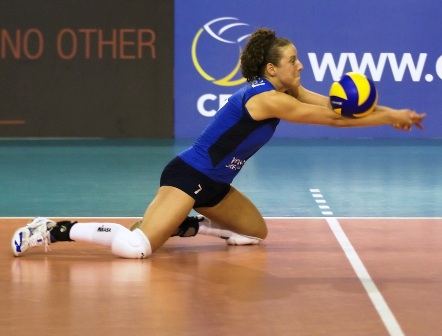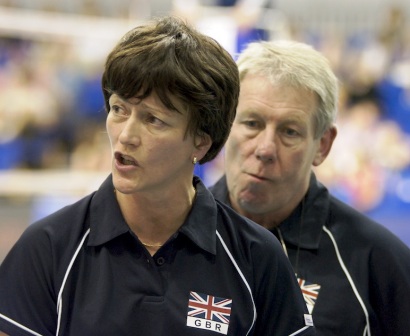
Maria Bertelli: on the receiving end
Incoming and outgoings
When UK Sport cut 2012 budgets at the start of the year, five sports including volleyball had their spending severely curtailed. Mick Owen spent a lovely afternoon in Sheffield finding out how GB VB is coping with the cuts.

Maria Bertelli: on the receiving end
On the day I coached my first volleyball international in 1995 the sun shone down from an azure sky, John Major’s government was struggling amidst allegations of sleaze and Everton were in the FA Cup final. Only a few months later the politics of Welsh sport and the distance from Derbyshire to Cardiff meant that I had succumbed to ‘coach burn-out’ – a recognised condition – and gone cold turkey on volleyball. From that day to this I have never knowingly coached a single second of volleyball, never seen it played live and always missed it. So when the chance came to monitor the current state of British volleyball I grabbed it and, on a day that saw Everton in the FA Cup final,and Gordon Brown’s government in deep trouble, I made my way to the English Institute of Sport in Sheffield..
The game has changed. They play ‘rally point’ now and there is a player called the ‘libero’ who never seems to leave the court but never gets to the front. There is also the fact that GB will be competing indoors at the Olympics next time round. Admittedly it’s a home Olympics and we’re going to get trounced but it’s still a huge deal. In fact it is such a huge deal that GB Volleyball (and the salary made available through 2012 funding) has attracted genuinely top coaches to our shores.. Harry Brokking, former coach of Holland, is in charge of our men and Lorne Sawula, who took Canada into the world top twenty, is coaching the women. At least he was until January this year when a UK Sport volte face saw five sports have their Olympic budgets slashed.
‘Slashed’ is a tabloid word but under the initial funding scheme the British Volleyball Federation, who have the task of getting six squads, when you count beach and sitting, to Stretford in some sort of shape, were expecting £4 million-plus to see them through to beyond the 2012 Games and now they have £1.1 million, so it is probably justified. Speaking at the time of the cut, probably through clenched teeth, British Volleyball Federation (BVF) president, Richard Callicot, said: “We are wholly unable to understand UK Sport’s thinking that, having heard and acknowledged the difficulties of delivering our uniquely complex sport, they should turn round and give us less money than they had originally planned to.” Kenny Barton, the BVF’s Olympics programme director, was equally forthright: “We are now in a dogfight for survival.”
I asked Barton the exact nature of the repercussions. “The board has taken a decision to keep the programmes functioning as near to a world-class performance level as possible,” he explained, “which will mean the current money will run out in December 2010 or thereabouts.” And what will this mean for our Olympic aspirations? “The lack of full finance means that we are not able to commit to full support services, nor a full training programme. We also have to look to making savings wherever possible, which has a knock-on effect on the performance level. We will lose development athletes and will concentrate totally on those who are already at the top level, which means slightly less competition for each position in the teams. We have already lost our women’s indoor head coach and our men’s coach will go part-time from August. The irresistible driving force of the 2012 Olympic Games taking our programmes forward is replaced by a cautious optimism that further funding will become available.”
Sitting at the top of the performance tree, Barton may not, and arguably should not, have his mind on the grass roots but as volleyball is a very small sport I asked what effect the Olympic cuts would have at community level. “Grass roots will be affected in that the volleyball community may not strengthen without the focus of the sport’s participation in London; the higher the performance goes the higher the profile of the sport goes and the more likely volleyball will recruit new members.” And that will clearly hamper any legacy that having six sides at 2012 would otherwise be expected to deliver? “The legacy will be that players playing in the programmes are now training and performing at a much higher level than before, and the home nations national competition will benefit from these players filtering back in to the national leagues and pushing the performance edge.” Which is hardly what Seb Coe promised Jacques Rogge in Singapore back in 2007.
Of course, where there are swings there must also be roundabouts and Audrey Cooper is one who might be enjoying the ride towards 2012. After two years sitting alongside Dr Sawula, Audrey is now front and centre and looking at some time in the Olympic goldfish bowl come 2012. She doesn’t seem phased. In fact she seems cool with it, possibly because she is on one of the shortest lists in British sport: she a British volleyball Olympian. In 1996 with Mo Glover she strutted her stuff, presumably in a tiny Union Jack bikini given the international governing body’s peculiar ‘uniform’ requirements, on the beach in Atlanta. Olympic experience will be vital come the big one and so will her coaching team.
With Sawula’s advice lost to her – although the word is he is still “chipping in from the sidelines” – Cooper has recruited a man called ’Gos’. Ian Goswell is not known universally as “the Gosfather of English volleyball” but he should be. Working from a school gym in Sale in the eighties, Goswell set up a production line that drew North West volleyball players in and turned out England players, plus the odd Welshwoman and Scot. And he was always nice with it. As a beginner coach I could and did ask all manner of daft questions and his advice to “never sleep with your setter” remains the tag line on my favourite coaching story. And there he was blinking in the lights and clangour of an international court once again. As an eminence gris, few in the British game could match him and Cooper has made at least one very astute selection decision.
The proof of any coaching team is in what happens when the first whistle blows and in all honesty there is work to be done. Given my absence from the tactical-technical maelstrom, it is hard to comment in depth on how Cooper deployed her attributes. Her libero, Maria Bertelli, is clearly a major source of energy and anyone with the hutzpah to command 50% and more of the court on serve-receive when the women down the other end are touching 3 metres and delivering genuine jump serves (as opposed to a float serve on the hop) deserves unalloyed admiration. Did enough first passes reach their target? Well the GB hitters never achieved any dominance so ‘probably not’. Did setter Lucy Wicks play with rhythm, disguise and dash? Not really; and, as her back-up only came on to signal the end of resistance as sets went away from GB, she needs to. Were GB good enough against a Turkish outfit labelled “development squad”? Well they only won one set and seemed to lack fire, belief and the determination that has its embodiment in players chasing ‘lost’ balls over hoardings and into the crowd. There were plenty of nice pick-ups from floor level, lots of teamy defiance as the points slipped away and the odd sharp word from the Cooper-Goswell duo; but just not enough passion. The crowd resorted to trying to put off the Turkish servers and GB got beat.
Is it a metaphor for the state of the British game? I think so. After a slow start ’we’ looked like we were going to tough out a result but once the opposition had focused, their technical and indeed physical superiority became obvious and GB were left trailing. As an indication of the mountain the women have to climb in three years, Turkey had an 18-year-old left-hander who stands six feet four inches tall and touches 3.08 metres when she spikes. Our best two-person block would reach about an entire ball width less than that. Ouch.
Mick Owen is managing editor of The Leisure Review. A highly experienced coach and tutor, has served his time on court in pursuit of volleyball success.
The Leisure Review, July 2009
© Copyright of all material on this site is retained by The Leisure Review or the individual contributors where stated. Contact The Leisure Review for details.

Audrey Cooper: leading from the front with Ian Goswell behind
Images © and courtesy of Lynne Marshall www.volleyballphotos.co.uk